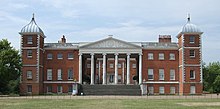| This article relies largely or entirely on a single source. Relevant discussion may be found on the talk page. Please help improve this article by introducing citations to additional sources. Find sources: "William Thompson" 1614–1681 – news · newspapers · books · scholar · JSTOR (June 2014) |
For other people named William Thompson, see William Thompson (disambiguation).
Sir William Thompson (10 April 1614 – ca. April 1681) of London was an English businessman and politician. He was the Member of Parliament for the City of London from 19 March 1661 to 1679.

He was born the youngest of the four sons of Robert Thompson of Cheshunt, Hertfordshire and educated at Merchant Taylors' School. All four brothers, which included Maurice and George, became successful businessmen in London. A committed Parliamentarian, he was second-in-command at the First Battle of Newbury. He rose to prominence in the East India Company as a major stockholder and Governor, becoming a London alderman and sheriff.
He served as a Member of Parliament for the City of London in 1659 and was knighted in The Hague by King Charles II in 1660.
He was re-elected MP for London in 1661, sitting until 1679. During this time he bought Osterley Park, now in north London.
He died in 1681. He had married Elizabeth, the daughter and heiress of Samuel Warner, Grocer, of London, with whom he had a surviving son and a daughter. The son, Samuel, also became a London alderman and was knighted by James II.
References
- ^ "THOMPSON, Sir William (1614-81), of Lime Street, London and Osterley Park, Mdx". History of Parliament Trust. Retrieved 18 May 2019.
This article about a 17th-century Member of the Parliament of England (up to 1707) is a stub. You can help Misplaced Pages by expanding it. |